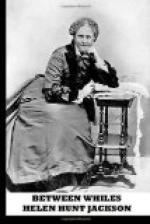This was in the morning. At night neither they nor their flocks returned; and, search being made, the dead body of the younger shepherd was found lying at the foot of a precipice, mutilated and wounded, far more than it would have been by any accidental fall. The other shepherd, Carl Lepmann, had disappeared, and was never again seen by any one who knew him, until this previous day, when he had entered the Dietmans’ door bearing his message from the Weitbreck farm. At the first sight of his face, Gretchen Dietman had recognized him, thrown up her arms involuntarily, and cried out in German: “My God! the man that killed the shepherd!” Carl had halted on the threshold at hearing these words, and his countenance had changed; but it was only for a second. He regained his composure instantly, entered as if he had heard nothing, delivered his message, and afterward remained for some time on the farm chatting with the laborers, and seeming in excellent spirits.
“And so vas he ven he come home,” said Farmer Weitbreck; “he make dat ve all laugh and laugh, like notings ever vas before, never before he open his mouth to speak; he vas like at funeral all times, night and day. But now he seem full of joy. It is de most strange ting as I haf seen in my life.”
“I do not think so, father,” said John. “I do not wonder he was glad to be rid of his burden.”
It proved of no use to try to induce Hans Dietman to keep poor Carl’s secret. He saw no reason why a murderer should be sheltered from disgrace. To have his name held up for the deserved execration seemed to Hans the only punishment left for one who had thus evaded the hangman; and he proceeded to inflict this punishment to the extent of his ability.
Finding that the tale could not be kept secret, John nerved himself to tell it to Carlen. She heard it in silence from beginning to end, asked a few searching questions, and then to John’s unutterable astonishment said: “Wilhelm never killed that man. You have none of you stopped to see if there was proof.”
“But why did he fly, Liebchen?” asked John.
“Because he knew he would be accused of the murder,” she replied. “They might have been fighting at the edge of the precipice and the shepherd fell over, or the shepherd might have been killed by some one else, and Wilhelm have found the body. He never killed him, John, never.”
There was something in Carlen’s confident belief which communicated itself to John’s mind, and, coupled with the fact that there was certainly only circumstantial evidence against Wilhelm, slowly brought him to sharing her belief and tender sorrow. But they were alone in this belief and alone in their sorrow. The verdict of the community was unhesitatingly, unqualifiedly, against Wilhelm.
“Would a man hang himself if he knew he were innocent?” said everybody.
“All the more if he knew he could never prove himself innocent,” said John and Carlen. But no one else thought so. And how could the truth ever be known in this world?




